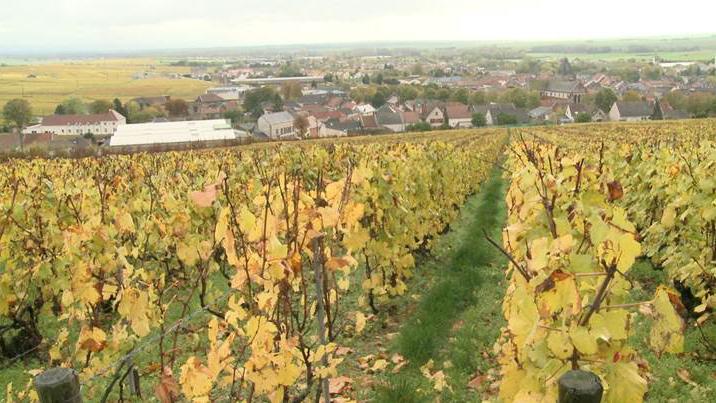With a changing climate, the French see trouble ahead for champagne
Climate change is starting to alter the centuries-old traditions of grape growers in the France’s Champagne region, like the Duval-Leroy Vineyard vineyard in the town of Vertus. For now, growers say when warming temperatures and shifting seasons aren’t wreaking havoc with their harvest, they are actually improving the quality of their wines. But growers worry about bigger problems as soon as 20 years from now.
If you're like millions of people around the world you might well be celebrating something this spring with a bottle of sparkling wine, perhaps even Champagne, the classic variety.
It’s the traditional drink for weddings and graduations, and the French sparkling wine has set the standard that others aspire to for centuries.
But that standard is under threat from something that's starting to affect all of us – climate change.
You could see that change at work in Vertus, a small town in France’s Champagne region, where the hills roll out in waves of Chardonnay, Pinot Noir, and Pinot Meunier grapevines, the varieties used to make Champagne. There was only one thing amissina picturesque valley peppered with the old stone houses of growers like Tattinger and Vueve Cliquot – the flowers.
“(It) was an exceptional year,” says Eric Fournel, director of the Duval-Leroy Vineyard, “very late. So we find ourselves with flowers in November.”
Fournel says the year brought late blooming roses and a late grape harvest, in October. That would’ve been relatively normal 20 years ago, but he says grapes here have been ripening earlier and earlier.
“Whether you’re speaking of 2003, 2007 or 2011, we have started the harvest in August,” Fournel says. Twenty years ago, it was usually the end of September.
Fournel doesn’t mind the earlier harvests, but he says the shifting climate in Champagne has sometimes meant trouble in the spring, because the grapes have also been budding earlier.
“We had strong freezes in the spring,” he says of 2012. “The early budding of the plant due to climate change makes them vulnerable to spring freezes, and we lost over half our harvest in May.”
Most winemakers here would describe that year as catastrophic. But Fournel says on balance, climate change so far has improved the quality of Champagne, helping the grapes develop richer sugars, with more potential alcohol and a decline in acidity from 20 years ago.
This makes for a "much more complex and balanced” wine, he says.
For the moment, the warming trend here has actually put Champagne makers in a sort of climatic sweet spot.
But things are changing fast. And it’s the future that has many here in France concerned.
Chief among them is Eric Duchene, at the National Institute for Agricultural Research in Colmar. The institute has a team of scientists studying the potential impacts of climate change on grapes.
Some of these are indirect, Duchene says,"like an insect moving north to France and carrying disease.”
Duchene is looking at the direct effects of temperature, and he doesn’t like what he sees.
“We are afraid because everywhere in the world, there is a kind of an optimum temperature for grape growing,” Duchene says. “And after a certain level, everywhere in the world you have a decrease in quality.”
Duchene and his team hope to learn which varieties can be bred to maintain their aroma despite the increasing heat.
Already, he says, the mean temperature increase in Champagne is higher than the global average – about 2 degrees over the last 40 years, he says, but even higher in the crucial growing season between April and September.
Those higher temperatures are pushing the limits of any climate sweet spot, which means that sweet spot may be on the move – from Champagne toward more northern regions like, the French shudder to think, England.
Champagne grower Duval-Leroy has actually considered buying land in England. But vineyard director, Eric Fournel, says England isn’t ready to produce excellent sparkling wine – yet.
“They have a problem,” Fournel say of growers in England. “Acidity and sugar. We have the same problem 20 years ago. (So) in 20 years, England Sparkling wine is very good. And Champagne…”
Fournel laughs and gives the thumbs down signal to Champagne when comparing it to English sparkling wines 20 years from now. Perhaps he’s joking at the absurdity of that scenario ever unfolding.
The French are certainly working hard to make sure it doesn’t. But if the rate of change already underway here continues, no one knows if the famed producers of Champagne will be able to stay ahead of climate change.
This reports was produced in partnership with the online news service The Daily Climate.
Our coverage reaches millions each week, but only a small fraction of listeners contribute to sustain our program. We still need 224 more people to donate $100 or $10/monthly to unlock our $67,000 match. Will you help us get there today?
